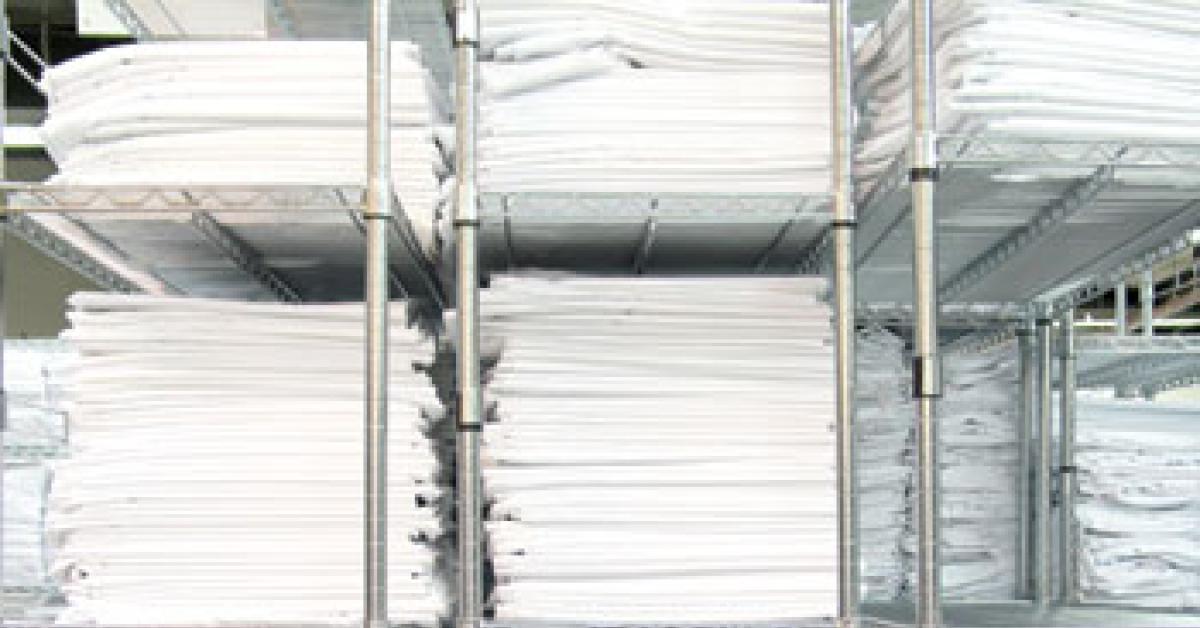FAIRWAY, Kan. — “I want clean crisp linen that I would feel comfortable wrapping around my own child.”
That’s what registered nurse Nancy Copp of the Kansas City Orthopedic Institute wants from her hospital laundry. The second request from this 30-year-veteran: “To always have the supply of linen I need.” Sounds reasonable, right?
What else do nurses have to say about hospital linen service?
- “Stains are not acceptable; anything with stains goes back to the soil bin.”
- “If a patient gown has broken snaps or a tear, we just throw it away.”
- “In-service education on linens? Doesn’t happen at my hospital.”
- “I’ve worked for 17 years as a nurse in four different hospitals. I’ve never seen reusable surgical gowns or textiles used in the OR.”
- “We don’t take a chance on using reusable surgical gowns because we know the disposable ones are better.”
- “Linen service is only as good as the hospital manager or nurse assigned to work with the laundry.”
In an effort to shed light on what hospitals want from their laundry providers (and, in doing so, provide intelligence to help providers meet healthcare client needs and expectations in 2012), a 360-degree review on the subject was in order.
In addition to interviews with environmental service (EVS) managers and nurses at a dozen hospitals across the country, about two dozen laundry operators were surveyed and interviewed.
While the nature of this review is anecdotal (i.e., not a scientific study), the feedback gathered resonates true.
The Situation
The healthcare sector is growing exponentially with the exploding population of retiring baby boomers and increasing longevity of seniors. According to the American Hospital Association (AHA)1, the nearly 5,795 registered hospitals in the country admit more than 37 million patients each year at a cost of $727 trillion. These numbers will only increase in the coming decades.
With healthcare linen comprising between 1% and 3% of a hospital’s budget, it’s not top of mind for most hospital executives or managers—unless there is a problem.
While every hospital needs a laundry to provide clean linens, it can be a resource that’s taken for granted.
In fact, a hospital’s attitude toward laundry might be compared to that which most of us have toward water. It’s a given that we need it, it is always there, the cost is reasonable, and we typically only complain if our cost increases or if there is a problem in receiving what we expect.
For example, one operator shared that his laundry will deliver 10,000 bath towels and get a complaint because there are five with stains.
Sonny Wyatt, EVS director for AnMed Health System in Anderson, S.C., and an inspector for the Healthcare Laundry Accreditation Council (HLAC), agrees. “Our laundry is great at on-time delivery and fill rates,” he says. “But healthcare textiles are sometimes overlooked [in the hospital environment], even though the linens we use deliver an important message to the patient upon their arrival at the hospital.”
Dedicated laundry operators work hard to deliver quality, clean linen to hospital clients on a daily basis. This includes pick up of soiled goods, which are then cleaned and delivered to hospitals. Products offered include sheets, pillowcases, blankets, towels, washcloths, patient gowns and often scrubs, as well as surgical towels, gowns, drapes and packs.
Whether an on-premise laundry, a shared-service cooperative or a third-party commercial operation, all laundries share many of the same challenges in serving hospital clients. And most operators think they understand their clients’ needs.
Tomorrow: What laundry operators think they want...
1 Fast Facts on U.S. Hospitals, derived from an American Hospital Association 2009 survey and published in the 2011 AHA Hospital Statistics Handbook. www.aha.org.
Have a question or comment? E-mail our editor Matt Poe at [email protected].
